Slide Commentary
7/16/97
Alex Tilson
 Outside of the airport. Notice the unique Georgian script.
Outside of the airport. Notice the unique Georgian script. Tbilisi, Georgia's lovely, cosmopolitan Capital. At the cross-roads of Europe and Asia, it has been sacked or destroyed more than 29 times in the last 1500 years.
Tbilisi, Georgia's lovely, cosmopolitan Capital. At the cross-roads of Europe and Asia, it has been sacked or destroyed more than 29 times in the last 1500 years.  Aaron and our "adopted" Georgian mom, Irene, returning from the market.
Aaron and our "adopted" Georgian mom, Irene, returning from the market. In Gori (Stalin's birthplace) we eat, drink, and make endless toasts.
In Gori (Stalin's birthplace) we eat, drink, and make endless toasts.  Stalin's home. The museum, like most things, was closed.
Stalin's home. The museum, like most things, was closed. Georgian bread truck.
Georgian bread truck. This was the third banquet we were invited to. Near Borjomi, the wine flows and the food keep on coming. The Georgian's truly must be the world's most hospitable people. Despite a troubled economy and an only recently ended civil war, the people are joyous and have a wonderful sense of occasion.
This was the third banquet we were invited to. Near Borjomi, the wine flows and the food keep on coming. The Georgian's truly must be the world's most hospitable people. Despite a troubled economy and an only recently ended civil war, the people are joyous and have a wonderful sense of occasion.  The Rioni River near Kutaisi, Georgia's second largest city. Here we tried to get a helicopter ride up into the Caucasus, but were told "Vertolet Kaput!" (The helicopter is broken)
The Rioni River near Kutaisi, Georgia's second largest city. Here we tried to get a helicopter ride up into the Caucasus, but were told "Vertolet Kaput!" (The helicopter is broken) Aaron climbs from Chaltubo up towards Tsageri.
Aaron climbs from Chaltubo up towards Tsageri. Georgian hiker.
Georgian hiker. When we told locals that we were heading further up into the mountains, they laughed at us. Know we knew why. We climb over an 8500 foot pass, with light snow flurries all around. Often the road was too steep, muddy, or rugged to bike.
When we told locals that we were heading further up into the mountains, they laughed at us. Know we knew why. We climb over an 8500 foot pass, with light snow flurries all around. Often the road was too steep, muddy, or rugged to bike. Ushguli, the highest continuously inhabited village in Europe. It is surrounded by stunning peaks and boasts 20 medieval watchtowers (formerly used for defensive purposes, but now used for grain storage and as an indicator of social status).
Ushguli, the highest continuously inhabited village in Europe. It is surrounded by stunning peaks and boasts 20 medieval watchtowers (formerly used for defensive purposes, but now used for grain storage and as an indicator of social status). Mud soaked and smelly, Aaron and I descend into the town of Ipari.
Mud soaked and smelly, Aaron and I descend into the town of Ipari. Our host in Ipari - Raji. Raji and his brother raced us 5 miles to their home, their horses narrowly edging our front wheels out at the finish.
Our host in Ipari - Raji. Raji and his brother raced us 5 miles to their home, their horses narrowly edging our front wheels out at the finish. The road degenerates further into Mestia. Our average speed this day was a mere 4.5 miles per hour.
The road degenerates further into Mestia. Our average speed this day was a mere 4.5 miles per hour. Aaron's trusty steed.
Aaron's trusty steed. Beautiful mountain village on the rough road from Mestia to Zugdidi.
Beautiful mountain village on the rough road from Mestia to Zugdidi. We followed the Inguri river, the dividing line between Abkhazia and Georgia, for the last 45 miles. Here some UN and Russian troops stopped us to inspect our bags, then gave us some sprats to eat for dinner. We tried to stay at the hotel in Zugdidi, but it had been blown up.
We followed the Inguri river, the dividing line between Abkhazia and Georgia, for the last 45 miles. Here some UN and Russian troops stopped us to inspect our bags, then gave us some sprats to eat for dinner. We tried to stay at the hotel in Zugdidi, but it had been blown up.  Beautiful tree-line highway (the Poti Chausee) leading into Poti, a major Black Sea port. Hydrofoils formerly plied the coast � south all the way to Batumi, or north up to Sochi.
Beautiful tree-line highway (the Poti Chausee) leading into Poti, a major Black Sea port. Hydrofoils formerly plied the coast � south all the way to Batumi, or north up to Sochi.  Alex and Ulli, two German motorcyclists we met who were riding around the Black Sea.
Alex and Ulli, two German motorcyclists we met who were riding around the Black Sea. Batumi, the third largest city in Georgia, is a thriving port. The markets overflowed with a bountiful fall harvest.
Batumi, the third largest city in Georgia, is a thriving port. The markets overflowed with a bountiful fall harvest.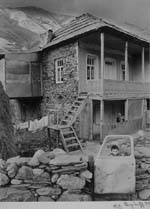
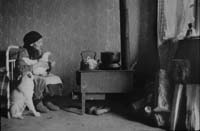
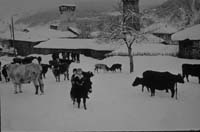
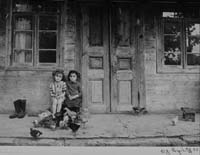
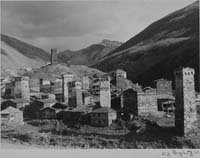
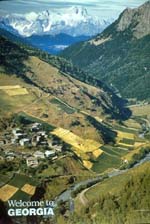
(Click on a photo to enlarge.) Photo credit Gia Chkhatarashvili, Tbilisi, Georgia.
 Leaving the lush Black Sea valleys behind, we rode the long climb up to the plateau of Armenia.
Leaving the lush Black Sea valleys behind, we rode the long climb up to the plateau of Armenia.  We had been in the Caucasus for two weeks, and this was the first time we camped. In every town, we had been offered free lodging, dinner, breakfast, and ample wine.
We had been in the Caucasus for two weeks, and this was the first time we camped. In every town, we had been offered free lodging, dinner, breakfast, and ample wine. 

 These are pictures we copied from a geologist that show Leninakan after its devastating earthquake in 1988. An estimated 30,000 people died. The town was partially rebuilt soon after, though today all of the cranes sit idle.
These are pictures we copied from a geologist that show Leninakan after its devastating earthquake in 1988. An estimated 30,000 people died. The town was partially rebuilt soon after, though today all of the cranes sit idle. People had great hopes for democracy in post-Soviet Armenia, the second largest per-capita recipient of U.S. foreign aid (after Israel). However, two days before we arrived in Yerevan, President Levon Ter-Petrosyan claimed re-election after a vote that was marred by "significant and serious breaches of the law." He either arrested or sent underground most of the opposition. When we arrived, group public meetings were banned and all major government and press buildings had tanks in front. We were told that photos were NOT allowed (unless the young troops could pose looking cool with their buddies).
People had great hopes for democracy in post-Soviet Armenia, the second largest per-capita recipient of U.S. foreign aid (after Israel). However, two days before we arrived in Yerevan, President Levon Ter-Petrosyan claimed re-election after a vote that was marred by "significant and serious breaches of the law." He either arrested or sent underground most of the opposition. When we arrived, group public meetings were banned and all major government and press buildings had tanks in front. We were told that photos were NOT allowed (unless the young troops could pose looking cool with their buddies). A memorial to the 1.5 million Armenians that were killed in the Turkish-led genocide at the end of WWI. Armenia maintains a very close relationship with Russia, convinced that without their aid Armenia would have long-ago been assimilated by Turkey. Mt. Ararat, the legendary resting place of Noah's Ark, towers 20 miles across the border.
A memorial to the 1.5 million Armenians that were killed in the Turkish-led genocide at the end of WWI. Armenia maintains a very close relationship with Russia, convinced that without their aid Armenia would have long-ago been assimilated by Turkey. Mt. Ararat, the legendary resting place of Noah's Ark, towers 20 miles across the border. A church overlooking Ozero Sevan, a beautiful, clear lake in the mountains near Yerevan.
A church overlooking Ozero Sevan, a beautiful, clear lake in the mountains near Yerevan. Aaron descends from the summit of Mt. Aragats, the tallest peak in Armenia (13,500). This is a very rigorous, but non-technical climb (watch out for quick changes of weather � including violent snow-storms). It is best approached from the town of Celo Shenavar, nearest to its eastern base.
Aaron descends from the summit of Mt. Aragats, the tallest peak in Armenia (13,500). This is a very rigorous, but non-technical climb (watch out for quick changes of weather � including violent snow-storms). It is best approached from the town of Celo Shenavar, nearest to its eastern base. A field near Mingacevir reservoir, Azerbaijan. We found Azerbaijan to be interesting but far less enjoyable than Georgia and Armenia. The country is Muslim (prepare to go days without seeing women), ruled by a dictatorial former head of the KGB, and is suffering from post-traumatic stress disorder from its defeat in the war with Armenia over the mountainous enclave of Karabakh.
A field near Mingacevir reservoir, Azerbaijan. We found Azerbaijan to be interesting but far less enjoyable than Georgia and Armenia. The country is Muslim (prepare to go days without seeing women), ruled by a dictatorial former head of the KGB, and is suffering from post-traumatic stress disorder from its defeat in the war with Armenia over the mountainous enclave of Karabakh.  Our hosts in Asagi-Salamabad.
Our hosts in Asagi-Salamabad.  Products for sale in the market: Barf detergent! A 355 ml can of Vodka with a pop-top: instadrunk!
Products for sale in the market: Barf detergent! A 355 ml can of Vodka with a pop-top: instadrunk! We passed fruit stands every mile. Pomegranets, pears, apples, and grapes.
We passed fruit stands every mile. Pomegranets, pears, apples, and grapes.  Like all former Soviet republics, Azerbaijan is racked by radical disparities in wealth. A schoolteacher normally earns only 35$ per month (a pittance when bread costs 35 cents per loaf), while "Bees-knees-men" control millions of dollars.
Like all former Soviet republics, Azerbaijan is racked by radical disparities in wealth. A schoolteacher normally earns only 35$ per month (a pittance when bread costs 35 cents per loaf), while "Bees-knees-men" control millions of dollars. Skinning a sheep on the side of the road.
Skinning a sheep on the side of the road.  Gobustan region, near Shamarhey.
Gobustan region, near Shamarhey. The unique architecture of the Azerbaijan parliament, Baku.
The unique architecture of the Azerbaijan parliament, Baku. The terminus of Alex and Aaron's ride, Baku and the Caspian Sea.
The terminus of Alex and Aaron's ride, Baku and the Caspian Sea. Capitalism comes to Azerbaijan! Hey, it's the Marlboro girls!
Capitalism comes to Azerbaijan! Hey, it's the Marlboro girls!  Alex donates his bicycle to the captain of the VeloTrek bicycle club.
Alex donates his bicycle to the captain of the VeloTrek bicycle club.
The End